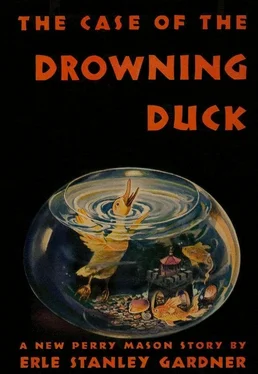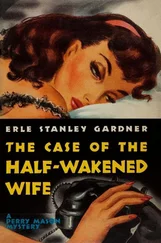“Heavy? Dumpy?” Mason asked.
“No. She’s slender and — flexible. Her skin’s in good shape. She’s taken good care of herself. I’m giving you the points a woman would notice. The externals, the style.”
“Blonde or brunette?”
“Decidedly brunette. She has large, dark eyes.”
“Glasses?”
“I think she has to wear them in order to see well, but she carries them in her purse. She was just putting the spectacle case away when I went out to talk with her. She uses her eyes to advantage.”
Mason said, “Tell me something about women, Della. Could she have let herself go to seed, and then brought herself back this way?”
“Definitely not,” Della Street said. “Not at the age of fifty-odd. She’s a woman who has taken care of herself all her life. She has eyes, and legs and hips, and she knows it — and uses them.”
“Interesting,” Mason said. “Let’s have a look at her.”
Della Street nodded, withdrew to escort Mrs. Dangerfield into the office.
The woman came directly toward Mason, walking with smooth, even rhythm. When she gave the lawyer her hand, it was with warmth and friendliness, and she raised long, dark lashes, and let him have the full benefit of her eyes. “I can’t begin to tell you how much I thank you for seeing me. I know you’re a very busy lawyer and that you see people by appointment only, but my business is particularly important, and,” she said, glancing at Della Street, “highly confidential.”
Mason said casually, “Sit down, Mrs. Dangerfield. I have no secrets from my secretary. She takes notes on conversations and keeps my records straight for me. I seldom trust anything to memory that can be put in writing. Make notes of what Mrs. Dangerfield has to say, Della.”
Mrs. Dangerfield took the rebuff with good grace. For a moment she stiffened; then she was smiling at Mason once more. “Of course! How stupid of me,” she said. “I should have known that a lawyer who handles as much work as you do, must systematize these matters. The reason I was concerned is because what I have to say is so very, very confidential. The happiness of others depends on it.”
Mason asked, “Did you wish to retain me to do something for you, Mrs. Dangerfield? Because if you did...”
“No, not at all. I wanted to talk with you about something you’re handling for someone else.”
“Sit down,” Mason invited. “A cigarette?”
“Thank you, I will.”
Mason gave her a cigarette, took one himself, and lit first one, then the other.
Mrs. Dangerfield sat down in the big chair, studied Mason for a moment in sidelong appraisal through the first puffs of her cigarette smoke, then said abruptly, “Mr. Mason, you’re doing some work for Mr. John L. Witherspoon.”
“What leads you to make that statement?” Mason asked.
“Aren’t you?”
Mason smiled. “You made an assertion. I’m asking a question.”
She laughed. “Well, I’ll change my assertion into a question.”
“Then I’ll still answer it with a question.”
She moved her long, well-manicured fingers in a nervous, drumming motion on the arm of the chair, took a deep drag from the cigarette, looked at Mason, and laughed. “I see I’m not going to get anywhere sparring with a lawyer,” she said. “I’ll put my cards on the table.”
Mason bowed.
She said, “My name is Mrs. George L. Dangerfield, just as I told your secretary. But my name has not always been Mrs. Dangerfield.”
Mason’s silence was a courteous invitation to proceed.
With the manner of one dropping an unexpected bit of information which will have explosive repercussions, she said, “I was formerly Mrs. David Latwell.”
Mason didn’t change expression. “Go ahead,” he said.
“That information doesn’t seem to surprise you,” she announced, her voice showing disappointment.
“A lawyer can seldom seem to be surprised — even when he is surprised,” Mason announced.
“You’re a very baffling individual,” she said, with just a trace of irritation in her voice.
“I’m sorry, but you said you wanted to put cards on the table.” Mason made a little gesture at the desk. “There’s the table.”
“Very well,” she surrendered. “I was Mrs. David Latwell. My husband was murdered by Horace Adams. Horace and David were in partnership in Winterburg City.”
“When did the murder take place?” Mason asked.
“In January of 1924.”
“And what happened to Adams?”
“As though you didn’t know!”
“Did you come to give information, or to try and get some?” Mason asked.
She thought that over for a moment, then turned to him frankly, and said, “A little of both.”
“Suppose you change the purpose of your visit and simply try to give me information.”
She smiled, “The murder was committed in the early part of 1924. Horace Adams was hanged in May of the year following.
“Horace had a wife — Sarah. Sarah and Horace, David and I, made a foursome on occasions. Horace and Sarah had a boy, Marvin. He was about two years old at the time of the murder, about three when his father was executed. I don’t think Sarah ever liked me or fully trusted me. Sarah was a mother. She devoted her entire life to her husband and to her child. I couldn’t see things that way. I was childless and — I was attractive. I liked to step around and see the night life a bit. Sarah didn’t approve of that. She thought a married woman should settle down in a rut.
“That was some twenty years ago. Ideas of marriage have changed some since then. I’m mentioning this to show that Sarah and I didn’t always get along too well, although, because our husbands were partners, we made things seem very smooth and harmonious on the surface.”
“Did the men know you didn’t get along?” Mason asked.
“Good heavens, no! It was too subtle for men to get, just the little things that women can do. The raising of an eyebrow at a proper time, or just the way she happened to look at the length of some skirt I’d be wearing; or when her husband would compliment me on my appearance and turn to her to ask her if she didn’t think I was getting younger every day, she’d agree with him. with just that cooing touch of sweetness which is entirely lost on a man but means so much to a woman.”
“All right,” Mason said, “you didn’t like each other. So what happened?”
“I’m not saying that,” she said. “I’m saying that Sarah didn’t approve of me. I don’t think Sarah ever liked me. I didn’t dislike her. I pitied her. Well, then the murder took place, and I could never forgive Horace Adams for the things that he said in trying to cover up that murder.”
“What were they?” Mason asked.
“He had killed David, and, as it turned out, had buried the body in the cellar of the manufacturing plant, and then cemented over the floor again. All I knew was that David had disappeared rather abruptly. Horace telephoned me there had been some trouble in connection with one of the patents, and David had had to go to Reno very hurriedly on business, that he’d write me just as soon as he got located there and found out how long he was going to have to stay.”
“Did the fact that he was going to Reno make you at all suspicious?” Mason asked.
“To tell you the truth, it did.”
“Why? Because he had been interested in some other woman?”
“Well, no — not exactly. But you know, how it is. We were childless, and — I loved my husband. Mr. Mason. I loved him a lot. As I’ve grown older, I realize that love isn’t everything in life, but at that age things seemed different to me. I made myself attractive because I knew we were never going to have any children and because I wanted to hang onto my husband. I tried to give him everything that any other woman could possibly offer. I tried to be just as attractive as the girls he’d meet who might want to flirt with him. I tried to keep his attention centered on me. I — oh, in my way, I lived my life for my husband just as well as Sarah lived her life for her husband, only Sarah had a child. That made things a lot different somehow.”
Читать дальше












